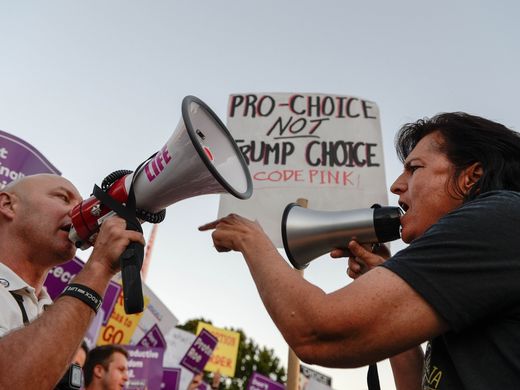WASHINGTON — With the future of abortion rights on the verge of changing like no time since before Roe v. Wade, advocates are presenting new arguments to plead their cases.
Both sides have amped up messaging in an effort to intertwine human rights and abortion since the retirement of Supreme Court Justice Anthony Kennedy and the precarious health and potential retirement of Justice Ruth Bader Ginsburg.
In addition, abortion proponents and opponents have strongly reacted to President Trump’s changes to Title X, a federal grant program that provides reproductive health care and birth control to low-income Americans. The new rule would block federal grant funding to family planning facilities, such as Planned Parenthood, which provide abortions.
Americans’ opinions on abortion, though polarized, have remained relatively unchanged since 1995, according to Pew Research Center. In a Pew poll on abortion conducted in September, 58 percent of Americans said abortion should be legal in all or most cases, while 37 percent said it should be illegal in all or most cases.
More: How younger generations are leading the abortion debate
Mary Ziegler, a professor at the College of Law at Florida State University, is an expert on the legal history of reproductive rights. Ziegler said the arguments employed by anti-abortion groups have remained mostly consistent since the Roe decision in 1973 with the exception of a shift toward focusing on the cost of abortion to “women, families, parents, partners, the sort of broader culture.”
For abortion advocates, Ziegler said the argument has shifted away from privacy and focused more on human rights in the context of international social justice.
“The language that you often see now is instead of reproductive rights, which would suggest that the government is going to leave you alone to do your own thing,” Ziegler said. “A lot of activists will use the language of reproductive justice.”
Abortion advocacy organizations such as Advocates for Youth and NARAL Pro-Choice America use the hashtags #reproductivejustice and #ReproFreedom to tie human rights to support for abortion rights, specifically.
While most anti-abortion advocates have at least tangentially tied their opposition to religion, groups such as Secular Pro-Life are now crafting arguments based on non-spiritual elements. SPL President Kelsey Hazzard, 30, of Florida, founded the organization 10 years ago when she felt the need for a community that espouses her views. The group, which is open to anyone who does not ascribe religious beliefs to their anti-abortion stance, operates completely online and has a following of over 22,000 on Facebook.
Hazzard said that President Trump’s decision to single out abortion during his State of the Union address earlier this month was a win for the anti-abortion movement but she disagreed with his religious appeal on the issue.
“I wish that he had taken more of a human rights approach to it,” Hazzard said. “But ultimately, obviously, the fact that he is responding to these extreme state-level laws, doing so vocally, doing so in the State of the Union, is really encouraging.”
Abortion messaging has become increasingly targeted toward specific audiences, including specific religious affiliations and members of low-income and/or marginalized communities.
Abortion rights advocates like Dr. Krystal Redman, 32, of Atlanta, Georgia, said women of color and members of the LGBTQ community are typically left out of the broader discussion of abortion rights.
Redman is the executive director of SPARK Reproductive Justice Now, an organization that champions reproductive rights for marginalized communities. The group hosts an annual advocacy day to lobby the Georgia state legislature and recently worked behind-the-scenes to help introduce a bill that would pull $2 million in grant funding from the state budget that goes to Crisis Pregnancy Centers, nonprofits that provide counsel and resources to persuade women not to have abortions. These facilities will provide ultrasounds for women to listen to the heartbeat or provide resources such as free diapers and gas cards to women seeking an abortion.
“When you think about rights, you automatically assume you have the right to make a choice,” Redman said. “A lot of black folks, a lot of people of color, a lot of queer folks, have been marginalized and they don’t have the luxury of making a choice for themselves.”
Religious-affiliated groups have also mentioned human rights as a rationale for their stance on abortion.
Glenn Northern, 50, is the domestic program director of Catholics for Choice in Washington, D.C., which was founded in 1973 as an abortion-rights advocacy organization that broke tradition with the Catholic Church’s anti-abortion doctrine.
Northern’s abortion rights stance is based on a woman’s right to follow her conscience in making the decision whether to have an abortion.
“The women are missing, when we talk about the culture of life,” Northern said. “It includes women too but that is not something that the opposition wants to actually look at with care, look at with compassion, look at with nuance.”
Cecily Routman, 59, of Sewickley, Pennsylvania, is the president of the Jewish Pro-Life Foundation, which began in 2006 as an organization focused on supporting members of the Jewish community who have had an abortion. One of the organization’s programs focuses on healing and is based on the repentance concept of Teshuvah in the Jewish faith.
Routman said she was pleased with Trump’s acknowledgement of the dignity of every person because she is concerned with the dehumanization of life in the womb.
“Just as in Germany, Jews were dehumanized to the place where people didn’t consider us human and so we didn’t have to be protected, so the unborn child has been dehumanized,” Routman said. “It’s been a systematic propaganda for decades now.”
The most recent data from the Centers for Disease Control and Prevention shows that the total number of reported abortions in 47 states, Washington, D.C. and New York City was down 24 percent from 842,855 in 2006 to 638,169 in 2015.


